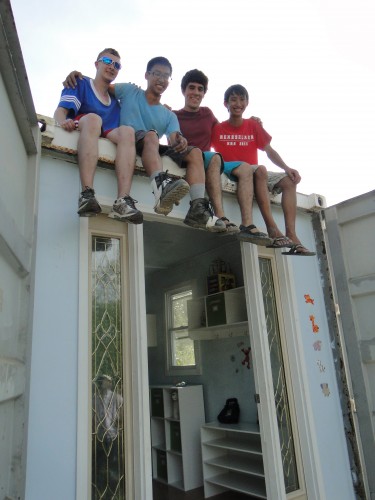 FOUR MEMBERS OF RPI’S CHAPTER OF ESW SIT on the roof of the day care they helped install in Rantlamouaie, Haiti. Haiti Mexico
FOUR MEMBERS OF RPI’S CHAPTER OF ESW SIT on the roof of the day care they helped install in Rantlamouaie, Haiti. Haiti MexicoFour members of Engineers for a Sustainable World from RPI, accompanied by a team from To Love a Child, traveled to a Rantlamouaie, small village, in Haiti to complete the installation of a new daycare center this summer. ESW helped Rantlamouaie last year by converting a shipping container into a health center, outfitted with solar panels for power. This year, Javier Camino ’14, Chris Warmann ’14, Andrew Chung ’12, and Nelson Lim ’11 used this same concept to design and construct a daycare center, complete with a playground and awning, right next to the health center.
The team shipped the container from home untouched, since altering it would compromise its structural integrity on route to the village. Once it arrived, the team eagerly worked on fitting the container with rugs, homemade cribs, and windows. The fitted lights and mounted additional solar panels on the health center instead of on the daycare center to consolidate the panels into one system. The team also created an awning to shade the children playing in the newly-built playground.
With all the improvements and fixtures, however, the trip was not without problems. The group used its resilience to solve any problems that came in its way. The solar panel that the team installed did not have a mount. As a result, a makeshift mount had to be made in Haiti. Additionally, batteries, needed for the project, could only be acquired in Port-au-Prince. Camino traveled to meet with one of the local leaders there, Father Milor, to get them. Fortunately, with all these problems, the locals were receptive to the help and even pitched in.
“People were excited to help build the container,” stated Camino. They constructed cribs, put up fences around the daycare center, and mounted the solar panels on the health care center.
In just a week, the group completed work on the center. As with last summer, the work made a significant impact on the locals’ quality of life by offering more power and facilities. Later this year, ESW will be working on developing clean cookstoves in Haiti.
For nine days during this summer, the RPI chapter of Engineers for a Sustainable World traveled to the Mayan village of Ek’Balam to build a working hot water system for showering. The chapter had been to Ek’Balam before to construct an Eco Hogar, or eco-friendly home, fully equipped with a 300 watt photovoltaic system. This time around, the team of five, Terrance McGovern ’15, Sam Brown ’15, Rosie Rickard ’15, Alexandra Allen ’15, and Javier Camino ’14, stayed at the home to improve it further on an Eco-friendly budget.
The group needed an inexpensive and effective way to heat water. Using only readily available resources and a photovoltaic system, a prototype was created and tested at RPI first. The thermal heating system consisted of a garbage can with a spigot, PVC piping, and cut-in-half water bottles. Cold water is fed into the garbage can, and the PVC piping, insulated by the water bottles, is placed into the can. As the water is heated, it rises up the PVC piping. Then, since the water was siphoned, water will continue to flow up the piping and discharge into another receptacle. Camino said the team planned the whole thermal heating system to cost under $50; it would be easy to assemble and acquire the materials in Mexico.
When they arrived at the village, two hours southwest of Cancun, they found the photovoltaic system in disrepair. The team quickly fixed it up and made sure another spider wouldn’t find its home in the controller again. They then repaired repaired the system and set up solar lights. After they had finished repairing everything, a power outage hit the village. Fortunately for the group, the very system that they had been working on provided them power through the outage.
“It was amazing to think that the system that we just fixed saved us right after we were done,” said Brown.
The next item on the list was the thermal heating system. As they had planned, the cost for everything was under $50 and was effective. In one hour, on a cloudy day, the system heated water from 77 to 95 degrees Fahrenheit, a significant change. This system, in addition to the existing solar panels, will improve quality of life in the village.
When asked about the experience, Rickard said, “The children were very excited to help and really interested in what we were doing.”
Due to inclement weather, the group was unable to coordinate a time to demonstrate the system to the locals. Additionally, the local plumber couldn’t find a time to hook up the thermal system to the shower system. To remedy this, the plumber was educated on how to link the two systems, and a member from the professional ESW chapter, graduate student Erin Lennox, was traveling to the village and gave a demonstration a few weeks after the original team had left.
Aside from some minor hiccups, the team accomplished what they had come for. The ESW, partnered with the Foundation for Developing Sustainable Societies, hopes to extend its reach to other nearby Mayan villages in the near future.
